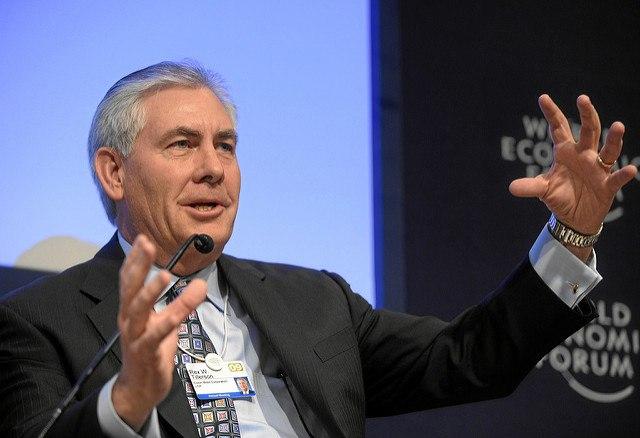
ExxonMobil and several of its competitors have said repeatedly that the time has come for a carbon tax. Such statements suggest to some environmentalists that these companies have “seen the light.” But a careful look at how ExxonMobil distributes its political donations should raise questions about whether legislation will ever pass. The company says it is lobbying for climate action, but when we follow the money, it becomes clear ExxonMobile is still more invested in climate denial.
Back in 2009, ExxonMobil CEO Rex Tillerson declared that the company would be open to a carbon tax. At the time the Congress and the Obama administration were trying to pass a carbon cap-and-trade scheme, modeled on a similar market-oriented program employed during George H.W. Bush’s presidency. The SO2 Allowance Program, passed by Congress and signed by the first President Bush, was part of a 1990 legislative agenda that largely reduced the sulfur dioxide emissions behind the headline-grabbing “acid raid” of the 1980s.
But when it came to cap-and-trade for the energy markets, oil companies balked at what they said was a complex, ineffective and expensive system. So Tillerson floated the idea of a carbon tax, which he said would be a “more direct, more transparent . . . and more effective approach.” Publications such as the Wall Street Journal, which in the past supported cap-and-trade programs, were in agreement. A cap-and-trade bill passed the House of Representatives, but died in the Senate in 2010.
Seeing the writing on the wall after this two-year slump in oil taxes, energy companies are offering a veneer of cooperation as policymakers and society have aligned on finding ways to reduce climate change risks. Companies like ExxonMobil still say they support the concept of a revenue-neutral carbon tax, which most experts say would have a minimal financial impact on consumers. Such revenues would pay for damages related to climate change while allowing society to shift toward a clean-energy economy.
But a review of ExxonMobil’s campaign contributions, especially during this election cycle, shows that the company is only paying lip service to the idea of a carbon tax. And what is even more clear is that the world’s eighth largest company is still padding the coffers of climate deniers serving in the current Congress.
A report issued earlier this year documented at least 182 climate deniers in the House and another 38 in the Senate. In the Senate, former presidential candidate Ted Cruz of Texas has received the most funds from ExxonMobil. In the House, Republican Fred Upton of Michigan scored the most donations from the company this year. Other contributors who benefitted from ExxonMobil’s largess include Rep. Pete Sessions of Texas and Rep. Evan Jenkins of West Virginia. If a carbon tax proposal makes its way to the halls of Congress next year, count on these fellows to lead the charge against any legislation.
When it comes to a carbon tax, Upton has described himself as “not a carbon tax guy.” Sessions pilloried the carbon tax as “an attack on American families.” In approving a resolution earlier this year that rejected any notion of a carbon tax, Jenkins released a statement saying that a carbon tax would “raise prices” and “reduce the number of hours people worked.” Cruz, of course, has gone on record of opposing any carbon tax.
Curiously enough, ExxonMobil could be hedging its bets, as its contributions to Hillary Clinton this year are second only to Cruz. But the disconnect between what ExxonMobil says publicly and where its political contributions are going should, at a bare minimum, raise eyebrows. The company says it is lobbying the energy industry and Congress to move forward, but following its trail of cash raises questions if this is all a charade.
As Huffington Post contributor and Union of Concerned Scientists writer Elliott Negin pointed out this week, the numbers behind the June House resolution condemning the notion of a carbon tax bear witness. “Eighty-five percent of the House members who voted for the resolution received ExxonMobil political donations since 2013,” Negin wrote. “The numbers are unambiguous: When it comes to a carbon tax, there’s no escaping the fact that ExxonMobil still funds legislators who don’t favor it and, by the same token, doesn’t support many who do.”
Image credit: World Economic Forum/Flickr

Leon Kaye has written for 3p since 2010 and become executive editor in 2018. His previous work includes writing for the Guardian as well as other online and print publications. In addition, he's worked in sales executive roles within technology and financial research companies, as well as for a public relations firm, for which he consulted with one of the globe’s leading sustainability initiatives. Currently living in Central California, he’s traveled to 70-plus countries and has lived and worked in South Korea, the United Arab Emirates and Uruguay.
Leon’s an alum of Fresno State, the University of Maryland, Baltimore County and the University of Southern California's Marshall Business School. He enjoys traveling abroad as well as exploring California’s Central Coast and the Sierra Nevadas.














